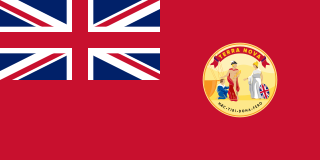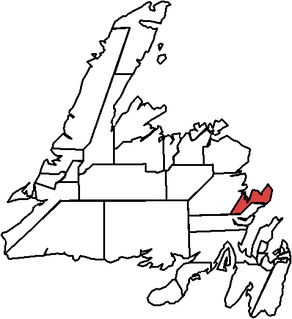The 11th Newfoundland general election was held in 1869 to elect members of the 10th General Assembly of Newfoundland in the Dominion of Newfoundland. 21 Anti-Confederates (A-C) were elected against 9 Confederates (Con), ending for a moment the debate over joining the Dominion of Canada.
The 9th Newfoundland general election was held in 1861 to elect members of the 8th General Assembly of Newfoundland in the Dominion of Newfoundland. 14 Conservatives and 12 Liberals were elected. The results in Harbour Grace and Harbour Main electoral districts were set aside following violence at the polls; members were elected in subsequent by-elections. The Liberal Party led by John Kent was defeated by the Conservatives led by Hugh Hoyles; Ambrose Shea replaced Kent as party leader.

The 8th Newfoundland general election was held in 1859 to elect members of the 7th General Assembly of Newfoundland in the Dominion of Newfoundland. 18 Liberals and 12 Conservatives were elected. The Liberal Party led by John Kent formed the government.
The 7th Newfoundland general election was held in 1855 to elect members of the 6th General Assembly of Newfoundland. This was the first election after responsible government was introduced to the Dominion of Newfoundland. The Liberal Party led by Philip Francis Little formed the government.
The 15th Newfoundland general election was held in 1882 to elect members of the 14th General Assembly of Newfoundland in the Dominion of Newfoundland. The Conservative Party led by William Vallance Whiteway formed the government.

The 13th Newfoundland general election was held in 1874 to elect members of the 12th General Assembly of Newfoundland in the Dominion of Newfoundland. The Conservative Party led by Frederick Carter formed the government.
The 14th Newfoundland general election was held in 1878 to elect members of the 13th General Assembly of Newfoundland in the Dominion of Newfoundland. The Conservative Party led by William Vallance Whiteway formed the government.

The 12th Newfoundland general election was held in November 1873 to elect members of the 11th General Assembly of Newfoundland in the Dominion of Newfoundland. The Anti-Confederates led by Charles Fox Bennett formed the government; a "new" Conservative party led by Frederick Carter formed the opposition.
The 17th Newfoundland general election was held on 6 November 1889 to elect members of the 16th General Assembly of Newfoundland in the Dominion of Newfoundland. The Reform Party administration of Robert Thorburn was defeated in favour of the Liberal Party led by William Whiteway formed the government. Reform soon disappeared and was replaced by the Orange Order based Tory Party. This was the first general election held in Newfoundland using the secret ballot.
The 18th Newfoundland general election was held on 6 November 1893 to elect members of the 17th General Assembly of Newfoundland in the Dominion of Newfoundland. Although the Liberals won the majority of seats, the Tory party filed petitions against 15 elected Liberals and one Independent, James Murray, alleging election irregularities. The results of those elections were set aside by the courts and the candidates were barred from seeking reelection. The Tory Party, led by Augustus F. Goodridge, temporarily holding the balance of power, formed a government in 1894. Once the resulting by-elections had been held, the Liberals regained the balance of power and formed a government led by Daniel J. Greene. Greene's government passed legislation allowing candidates who had been disqualified to seek election again. William Whiteway was subsequently reelected in a by-election in early 1895 and became Premier.
The 19th Newfoundland general election was held on 28 October 1897 to elect members of the 18th General Assembly of Newfoundland in the Dominion of Newfoundland. The Tory Party led by James Spearman Winter formed the government. On February 15, 1900, the government was defeated following a vote on a motion of no confidence which was supported by the Liberals and several Tories.
The 20th Newfoundland general election was held on 8 November 1900 to elect members of the 19th General Assembly of Newfoundland in the self-governing British colony. The Liberal Party led by Robert Bond formed the government. The unpopular railway policy of the Conservatives contributed to their defeat at the polls. The Tory government of James Spearman Winter was defeated largely due to its railway policy and his conservative party fell into disarray.
The 21st Newfoundland general election was held on 31 October 1904 to elect members of the 20th General Assembly of Newfoundland in the Dominion of Newfoundland. The Liberal Party led by Robert Bond formed the government.
The 22nd Newfoundland general election was held on 2 November 1908 to elect members of the 21st General Assembly of Newfoundland in the Dominion of Newfoundland. The seats were split evenly between the Liberal Party and the new Newfoundland People's Party formed by Edward Morris after he resigned from the Liberal government in 1907 and joined with the opposition. Robert Bond, the Liberal leader, asked the Governor William MacGregor to dissolve the assembly. MacGregor refused to do this and Bond resigned as Premier. The Governor asked Edward P. Morris to form a government. The assembly was not able to elect a speaker and, after the Governor was unable to convince the two party leaders to form a coalition government, the house of assembly was dissolved on April 9, 1909.

The 23rd Newfoundland general election was held on 8 May 1909 to elect members of the 22nd General Assembly of Newfoundland in the Dominion of Newfoundland. The Newfoundland People's Party led by Edward P. Morris, having secured a majority, formed the government.

The 24th Newfoundland general election was held on 30 October 1913 to elect members of the 23rd General Assembly of Newfoundland in the Dominion of Newfoundland. The Liberal Party led by Robert Bond formed a coalition with the Fishermen's Protective Union led by William Coaker. Although the majority held by the Newfoundland People's Party was reduced in this election, it was again returned to power and Edward P. Morris continued to serve as Prime Minister of Newfoundland. A general election originally scheduled for 1917 was deferred until 1919 because of World War I. After Morris retired from politics in 1918, William F. Lloyd, a Liberal member of the Executive Council, was asked to form a government. In May 1919, Michael Patrick Cashin, the leader of the People's Party, introduced a motion of no confidence which resulted in the defeat of the government. Cashin served as Newfoundland prime minister until the election held later in 1919.
The 25th Newfoundland general election was held on 3 November 1919 to elect members of the 24th General Assembly of Newfoundland in the Dominion of Newfoundland. The Liberal Reform Party, an alliance between the Liberals led by Richard Squires and the Fishermen's Protective Union of William Coaker, formed the government. The People's Party, became the Liberal-Labour-Progressive party following the election and formed the opposition. Squires served as Newfoundland prime minister.

The 26th Newfoundland general election was held on 3 May 1923 to elect members of the 25th General Assembly of Newfoundland in the Dominion of Newfoundland. The Liberal Reform Party, an alliance between the Liberals led by Richard Squires and the Fishermen's Protective Union of William Coaker, formed the government. The Liberal-Labour-Progressive party, now led by William J. Higgins, formed the opposition. Squires was forced to resign as Prime Minister in 1923 after allegations of corruption were brought forward. William Warren became Liberal Reform Party leader and Prime Minister. After Warren's government was defeated following a motion of no confidence, Albert Hickman was asked to form a government and Warren joined Higgins in a new Liberal-Conservative Progressive Party.

The 27th Newfoundland general election was held on 2 June 1924 to elect members of the 26th General Assembly of Newfoundland in the Dominion of Newfoundland. The Liberal-Progressives and Liberal-Conservative Progressives were new parties formed as a result of the collapse of the ruling Liberal Reform Party. The Liberal-Conservative Progressives were led by Walter Stanley Monroe and won the election weeks after the party's creation. During his time in office, Monroe alienated a number of his supporters: Peter J. Cashin, F. Gordon Bradley, C. E. Russell, Phillip F. Moore, Lewis Little and H.B.C. Lake, who all defected to the opposition Liberal-Progressive Party. In 1926, universal suffrage was introduced in Newfoundland: women over the age of 25 were allowed to vote. Monroe was replaced by Frederick C. Alderdice as Prime Minister in August 1928.

The 28th Newfoundland general election was held on 2 June 1928 to elect members of the 27th General Assembly of Newfoundland in the Dominion of Newfoundland. The Liberal Party led by Richard Squires defeated the Conservative Party led by Frederick C. Alderdice and formed the government with the support of Fishermen's Protective Union members. Legislation had been introduced so that persons named to the Executive Council were no longer required to run for reelection. Helena E. Squires, elected in a 1930 by-election, became the first woman elected to the Newfoundland assembly.











